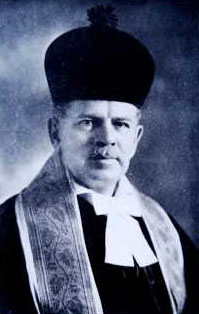 Kwartin was born on 25th March 1874 in Chonorod, Elisabetgrad, Russia, to a wealthy Chassidic textile merchant. From a very early age he exhibited a beautiful voice and his father took him to the famous Chazan, Yerucham Hakatan (also known as Yerucham Blindman), to hear his son sing and get a professional opinion of his abilities.
Kwartin was born on 25th March 1874 in Chonorod, Elisabetgrad, Russia, to a wealthy Chassidic textile merchant. From a very early age he exhibited a beautiful voice and his father took him to the famous Chazan, Yerucham Hakatan (also known as Yerucham Blindman), to hear his son sing and get a professional opinion of his abilities.
According to Zavel's own account, the ageing Chazan was deeply impressed by him and wanted to take the boy as his pupil. His father however was not too keen on the idea though, believing that a career in textiles might be rather more secure than one in Chazanut.
On his marriage he went to Shul with his in-laws in Yelisvatgrad and was invited to say the Haftara. The congregation was very impressed with his rendering of the Berachot and he was prevailed upon to conduct Musaf. It was on this occasion that the seeds of his golden career were sown.
Kwartin took music and singing lessons with the finest teachers of his time and on June 1st 1896 he gave his first public concert. He states that he was a great success. The following year he gave a concert in Lodz for which he was paid more than 400 roubles and he continued to travel in Europe, concertise and conduct services to great acclaim.
In 1903 he was appointed Obercantor of the Queen Elizabet Temple of Vienna where his salary was 2,500 krone per annum, an extraordinary salary by any standards.
In 1914 Kwatrin was invited to come to America for a fee of $30,000 for a series of 30 concerts. Because of the war this was postponed and it wasn't until April 1920 that he eventually got there.
His first concert, which was not a success, was at the Metropolitan Opera House. Fortunately though he redeemed himself at the 'Hippodrome' and went on from there to tour America, with great success.
He decided to remain in the States and was appointed Chazan at the Temple Emanuel where his salary was $12,000. He also continued to give concerts and was possibly the highest-paid Chazan of all time.
Kwartin published two volumes of his three-volume work, 'Z'mirot Zevulon' in 1928, (the third was published in 1937). They contain the music to most of his famous pieces, 'Tiheir Rabbi Yishmoel, Ve'al Yedei Avodecho, etc', and is still widely used.
Zavel was deeply moved by his first visit to the Holy Land and eventually built a home for himself on Mount Carmel. The last fifteen years of his life were spent in the USA, and when he died on 3rd October 1952, he was brought to Israel for burial.
Zavel Kwartin made numerous recordings, many of which have been electronically enhanced and re-released. Through them, his phenomenal voice still lives on.
These recordings were produced prior to 1923 and are in the public domain.

































































































































































